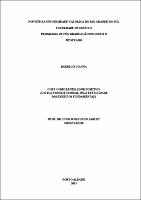| Compartilhe o registro |


|
Use este identificador para citar ou linkar para este item:
https://tede2.pucrs.br/tede2/handle/tede/4227Registro completo de metadados
| Campo DC | Valor | Idioma |
|---|---|---|
| dc.creator | Vianna, Rodrigo | - |
| dc.creator.Lattes | http://buscatextual.cnpq.br/buscatextual/visualizacv.do?id=K4387704Y5 | por |
| dc.contributor.advisor1 | Sarlet, Ingo Wolfgang | - |
| dc.contributor.advisor1Lattes | http://buscatextual.cnpq.br/buscatextual/visualizacv.do?id=K4793991Y6 | por |
| dc.date.accessioned | 2015-04-14T14:34:02Z | - |
| dc.date.available | 2013-09-10 | - |
| dc.date.issued | 2013-06-24 | - |
| dc.identifier.citation | VIANNA, Rodrigo. O STF como legislador positivo : justiça constitucional pela efetividade dos direitos fundamentais. 2013. 40 f. Dissertação (Mestrado em Direito) - Pontifícia Universidade Católica do Rio Grande do Sul, Porto Alegre, 2013. | por |
| dc.identifier.uri | http://tede2.pucrs.br/tede2/handle/tede/4227 | - |
| dc.description.resumo | Esta dissertação tem por objeto o papel do STF no controle da omissão normativa inconstitucional e, por objetivo, demonstrar que, neste enfrentamento, o Tribunal Constitucional pode e deve desempenhar, como de fato desempenha, uma atuação normativa em sentido amplo e mesmo materialmente legislativa em sentido estrito, sobretudo a bem da eficácia e da efetividade dos direitos fundamentais, sem que isso implique ofensa à arquitetura constitucional de repartição e compartilhamento funcional do exercício do poder, bem como à democracia. Inicialmente, a partir de uma análise crítica da ideia de separação de poderes, aborda-se a inserção da Justiça Constitucional na repartição e no compartilhamento do exercício das funções do Estado, destacando-se a sua multifuncionalidade. Na sequência, enfoca-se a legitimidade democrática da Justiça Constitucional, com os principais fundamentos institucionais, procedimentais e substanciais que a legitimam para dialogar com os demais órgãos de soberania. Passa-se, então, ao exame da posição ocupada pelos direitos fundamentais no Estado Democrático de Direito e a omissão inconstitucional, especialmente a normativa, como grande óbice à sua eficácia e efetividade. Por fim, enfoca-se especificamente, com análise de jurisprudência, a atuação do STF como legislador positivo, no enfrentamento da omissão normativa inconstitucional, com seus pressupostos, características e limites. | por |
| dc.description.abstract | This dissertation concerns the role of the STF Supreme Federal Court in regards to controlling the unconstitutional normative omission. It aims to demonstrate that, in this confrontation, the Constitutional Court can and must perform, as it does, a role that is normative in a wide sense and even materially legislative in a strict sense, above all, for the sake of efficiency and effectiveness of the fundamental rights, without incurring offense to the constitutional architecture of functional sharing and distribution of power, neither to democracy. In the first part, based on a critical analysis of the idea of separation of powers, we discuss the insertion of Constitutional Justice in the sharing and distribution of the exercise of the functions of the state, emphasizing its multifunctional aspect. Following that, we focus on the democratic legitimacy of Constitutional Justice, presenting the main substantial, procedural and institutional foundations, which legitimate it to dialogue with the other sovereign institutions. The second part begins by examining the position occupied by the fundamental rights in the Democratic Rule-of-Law State and the unconstitutional omission, in special, the normative one, as a great obstacle to its efficiency and effectiveness. Finally, with analysis of jurisprudence, the thesis specifically focuses on the performance of the STF as the positive legislator in confronting the unconstitutional normative omission, with its assumptions, characteristics and limitations. | eng |
| dc.description.provenance | Made available in DSpace on 2015-04-14T14:34:02Z (GMT). No. of bitstreams: 1 450662.pdf: 484993 bytes, checksum: 5995a417ee3bac43d6724d9453113537 (MD5) Previous issue date: 2013-06-24 | eng |
| dc.format | application/pdf | por |
| dc.thumbnail.url | http://tede2.pucrs.br:80/tede2/retrieve/14533/450662.pdf.jpg | * |
| dc.language | por | por |
| dc.publisher | Pontifícia Universidade Católica do Rio Grande do Sul | por |
| dc.publisher.department | Faculdade de Direito | por |
| dc.publisher.country | BR | por |
| dc.publisher.initials | PUCRS | por |
| dc.publisher.program | Programa de Pós-Graduação em Direito | por |
| dc.rights | Acesso Aberto | por |
| dc.subject | DIREITO | por |
| dc.subject | DIREITOS FUNDAMENTAIS | por |
| dc.subject | DEMOCRACIA | por |
| dc.subject | SEPARAÇÃO DE PODERES | por |
| dc.subject.cnpq | CNPQ::CIENCIAS SOCIAIS APLICADAS::DIREITO | por |
| dc.title | O STF como legislador positivo : justiça constitucional pela efetividade dos direitos fundamentais | por |
| dc.type | Dissertação | por |
| Aparece nas coleções: | Programa de Pós-Graduação em Direito | |
Arquivos associados a este item:
| Arquivo | Descrição | Tamanho | Formato | |
|---|---|---|---|---|
| 450662.pdf | Texto Parcial | 473,63 kB | Adobe PDF |  Baixar/Abrir Pré-Visualizar |
Os itens no repositório estão protegidos por copyright, com todos os direitos reservados, salvo quando é indicado o contrário.




